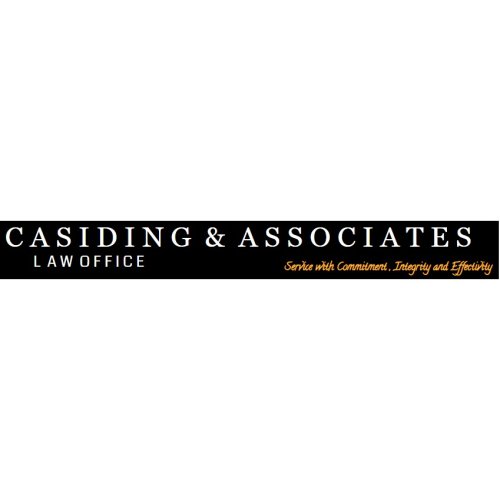Best Funds & Asset Management Lawyers in Philippines
Share your needs with us, get contacted by law firms.
Free. Takes 2 min.
Or refine your search by selecting a city:
List of the best lawyers in Philippines
About Funds & Asset Management Law in Philippines
Funds and asset management law in the Philippines governs the establishment, operation, and regulation of investment funds, fund managers, and related entities such as asset management companies. This field ensures that the investment industry operates within a legal framework that protects investors, promotes transparency, and upholds market integrity. It encompasses both public collective investment schemes (like mutual funds and unit investment trust funds or UITFs) and private funds, along with the guidelines for licensing, disclosure, compliance, and investor protection.
Why You May Need a Lawyer
There are several situations where legal advice is crucial in funds and asset management in the Philippines. You may need a lawyer if you are:
- Setting up an investment fund or asset management business
- Ensuring regulatory compliance with the Securities and Exchange Commission (SEC) or Bangko Sentral ng Pilipinas (BSP)
- Drafting or reviewing fund agreements, prospectuses, and disclosure documents
- Handling investor disputes, claims, or complaints
- Restructuring existing funds or assets
- Addressing tax-related issues connected to investments or fund operations
- Navigating cross-border investments and foreign participation restrictions
- Responding to regulatory investigations or enforcement actions
Local Laws Overview
The primary legal framework for funds and asset management in the Philippines includes:
- The Investment Company Act (Republic Act No. 2629), which regulates mutual funds and investment companies
- The Securities Regulation Code (Republic Act No. 8799), covering securities offerings, including units or shares of investment funds
- SEC rules and regulations, which prescribe requirements for registration, disclosure, reporting, and management of mutual funds and asset management companies
- The BSP regulations concerning banks and trust entities, especially regarding UITFs and wealth management products
- Anti-money laundering regulations, which impose strict “know your client” and reporting obligations
- Tax laws as they apply to investment income, capital gains, and fund structures
Fund managers and asset management companies must be duly registered and licensed. There are also strict rules regarding the marketing of investment products and cross-border activities.
Frequently Asked Questions
What types of investment funds are allowed in the Philippines?
The main types are mutual funds, unit investment trust funds (UITFs), and limited partnership investment companies. There are also private funds available to qualified buyers or institutional investors.
Who regulates funds and asset managers in the Philippines?
The Securities and Exchange Commission (SEC) regulates investment companies, fund managers, and related entities. The Bangko Sentral ng Pilipinas (BSP) oversees UITFs managed by banks and trust entities.
What licenses are needed for fund managers?
Fund managers must register with the SEC and obtain the necessary secondary license to operate as investment company advisers. For UITF managers, a BSP Trust License is required.
Are foreign investors allowed to invest in Philippine investment funds?
Yes, subject to Philippine laws and any restrictions imposed by the fund’s structure or industry-specific foreign ownership caps.
What are the disclosure requirements for investment funds?
Funds must provide offering documents or prospectuses that detail investment objectives, risks, fees, management details, and performance history, among others.
Are there minimum capital requirements for setting up a fund?
Yes, minimum capital requirements exist for investment companies and fund managers as determined by SEC regulations.
How are investor disputes handled?
Disputes may be resolved through internal complaints processes, mediation, arbitration, or formal litigation depending on contract provisions and the nature of the dispute.
Are there special regulations for hedge funds or private equity funds?
Private funds offered only to qualified buyers may have relaxed requirements, but anti-fraud and anti-money laundering laws still apply. They may not publicly solicit investments unless registered.
What are the tax implications of investing in funds?
Different types of funds and income (interest, dividends, capital gains) may be subject to various taxes. Tax treatment depends on the fund structure and investor type.
Can funds invest in foreign securities?
Yes, subject to the fund’s stated investment policies, SEC approval, and compliance with foreign exchange regulations of the BSP.
Additional Resources
If you need further information or have specific questions, the following resources may be helpful:
- Securities and Exchange Commission (SEC) - The main regulator for securities and investment companies
- Bangko Sentral ng Pilipinas (BSP) - Regulates banks and trust entities offering investment products
- Philippine Investment Funds Association (PIFA) - Industry body for mutual funds
- Bankers Association of the Philippines (BAP) - Includes information on trust and asset management services
- Bureau of Internal Revenue (BIR) - For taxation matters related to investments
Next Steps
If you are considering establishing, investing in, or managing a fund or asset in the Philippines, it is advisable to begin by consulting with a lawyer who specializes in securities and funds law. Prepare a summary of your objectives, proposed investment activities, and relevant documents. Reach out to qualified legal professionals for an initial consultation. They can assess your situation, clarify your legal position, and help ensure compliance with all regulatory requirements. Timely legal advice can help you avoid costly mistakes, regulatory penalties, and future disputes.
Lawzana helps you find the best lawyers and law firms in Philippines through a curated and pre-screened list of qualified legal professionals. Our platform offers rankings and detailed profiles of attorneys and law firms, allowing you to compare based on practice areas, including Funds & Asset Management, experience, and client feedback.
Each profile includes a description of the firm's areas of practice, client reviews, team members and partners, year of establishment, spoken languages, office locations, contact information, social media presence, and any published articles or resources. Most firms on our platform speak English and are experienced in both local and international legal matters.
Get a quote from top-rated law firms in Philippines — quickly, securely, and without unnecessary hassle.
Disclaimer:
The information provided on this page is for general informational purposes only and does not constitute legal advice. While we strive to ensure the accuracy and relevance of the content, legal information may change over time, and interpretations of the law can vary. You should always consult with a qualified legal professional for advice specific to your situation.
We disclaim all liability for actions taken or not taken based on the content of this page. If you believe any information is incorrect or outdated, please contact us, and we will review and update it where appropriate.
Browse funds & asset management law firms by city in Philippines
Refine your search by selecting a city.

















